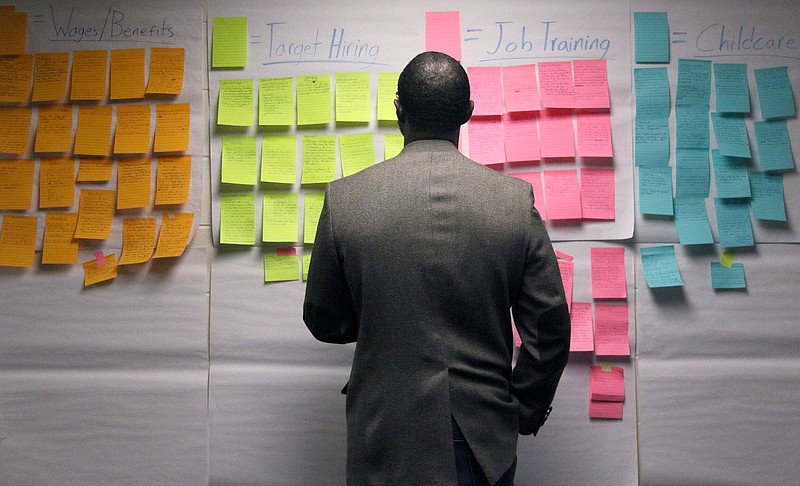East Chattanooga residents want Nippon Paint, which plans to build a $61 million manufacturing operation on the former Harriet Tubman housing site, to offer job training, livable wages, targeted hiring and worker child care.
The city of Chattanooga and the Chattanooga Area Chamber of Commerce have already worked out a formal deal with the Japanese company that was approved by the Chattanooga City Council a few weeks ago. The city donated the land to Nippon Paint and agreed to help the company recruit and screen employees in exchange for the company's capitol investment, as well as its commitment to create 150 jobs and work with the city to hire from the Avondale neighborhood.
However, a newly formed seven-member Tubman Opportunity Steering Committee, is collecting resident feedback and may ask the business to do more. A handout given to the nearly 70 people who attended Saturday's town hall discussion at Orchard Knob Missionary Baptist Church explained the community-based committee's objectives:
* Gain input from East Chattanooga residents regarding to development of the former Harriet Tubman public housing site.
* Represent the interests of East Chattanooga residents, by negotiating benefits for their community with both the city and the company developing the site, as an independent third party, separate and distinct from the city and the company developing the site.
* Share information with the community about the progress of negotiations, as well as any information discussed and disclosed during the negotiations, for further consideration by the community.
Several community organizations expressed frustration with city officials earlier this year when the former Tubman site was rezoned for light manufacturing use before the Historic River-to-Ridge Area Plan, also known as the Area 3 Plan, was complete. Those same organizations - including the Unity Group, Hope for the Inner City, the Glass House Collective, Accountability for Taxpayer Money and several neighborhood associations - held a town hall in March to discuss the possibility of a community benefits agreement.
In Tennessee, and in many other Southern states, state law says city governments cannot require businesses to sign and adhere to CBAs because many of the requirements typical of CBAs infringe on developers' right to do business as they please. That is not the case in many other states. That means city officials cannot be involved in negotiations. However, CBAs signed when developers face opposition from city councils - hoping to appease angry constituents - are considered legally binding contracts.
After the March meeting, Everlena Holmes and several other East Chattanooga neighborhood leaders created a survey to ask what residents might want to include in a potential CBA, and over the summer, a small team of volunteers knocked on close to 1,000 doors and collected 210 complete surveys in the seven neighborhoods around the Tubman site.
TUBMAN TIMELINE
1953: First phase of Harriet Tubman complex completed 1963: Expansion grows size of complex 2005: Chattanooga Housing Authority demolishes 10 buildings 2012: CHA evicts residents, puts complex up for sale 2013: Lakewood Realty Group agrees to buy site for $2.8 million, but the deal is never closed 2014: The city acquires the 440-unit complex and begins demolition 2019: The site is rezoned from residential to manufacturing in January. In September Nippon Paint announces plans for 150-employee plant
Nearly 24% of residents said job training was their top priority. A little more than 20% said affordable housing was their top priority; 17.5% named living wage as their top priority; 17% named targeted hiring programs; and another 17% named child care facilities, a report provided to those who attended Saturday's town hall read. Additional feedback on residents' desires for the former Tubman site were collected at Saturday's meeting.
Charita Allen, deputy administrator for economic development with the city, explained how the Nippon deal came about and told the audience that her office has been working since 2017 to collect community input on the site but found opinions differed.
"Do we do nothing because there is no consensus or do we do something trying to find that middle ground?" she asked the crowd. "Some people in the community were upset because we talked about putting housing on the site. Some people were upset with us because we wanted to put jobs on the site."
Charles Wood, vice president of economic development at the chamber, sold Nippon Paint as a win for the community. It plans to build a LEED-certified building, and most the jobs offered by the company will have wages ranging between $16 and $22 dollars an hour. The company, which will hire those with and without a college degree, is open to hiring people with a felony background but will drug test, he said.
"This is not a lot of jobs, but we want to make sure we are working with a company that is oriented toward economic mobility within the company. If they don't hit their numbers they pay for everything," he said.
"This site was not an easy sell," he added. "There were a lot of companies who said, 'You couldn't pay me to go there. There have been three shootings within blocks.'"
A few community members started to talk over Wood, angry that he brought up crime in the neighborhood, and Wood apologized.
"I want to apologize," he said. "I know that that is not easy to hear, but this is not an easy process."
The steering committee plans to compile the information collected Saturday and email the results in two weeks. In January, they plan to hold another town hall to update residents on their communication with Nippon. The biweekly steering committee meetings are open to the public, said Quentin Lawrence, deputy director of Hope for the Inner City and a steering committee member.
"We want this process to continue on until we get to a place where we as a community feel comfortable with the benefits being laid out. This is not an us against them process. This is a negotiation process. This isn't the big corporation and little old us. We are a community. We are the ones with power and are equal at the negotiating table," he told the crowd. "We don't need to feel like we are in a powerless position. We have elected those officials. We are equal players. How can we hear each other and make sure the community benefits from what is taking place. We have to stay the course."
Contact Joan McClane at jmcclane@timesfreepress.com.

